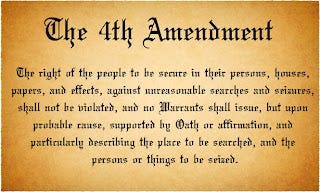NH Bill would ban certain searches without probable cause.

Concord, NH - If you leave your fingerprints or DNA on a glass, that doesn't mean law enforcement or an insurance company can take that glass and use the information from it without a court warrant, according to legislation proposed this session.
One of the House's most vocal privacy advocates, Rep. Neal Kurk, R-Weare, said he believes state residents do not expect law enforcement, insurance companies or "data miners" to have access to their personally identifiable information when they throw something out in their trash or leave a drinking glass with their saliva on it at a restaurant.
People do not give up their rights to their personally identifiable information because they leave a beer glass in a bar, he said.
House Bill 311 would protect people's identifiable information such as DNA, retinal scans, fingerprints, personal biometrics, credit cards, phone numbers and work histories from use without a court issued warrant supported by probable cause.
Under the bill, it would be a class B misdemeanor with a $1,000 fine to knowingly obtain a person's identifying information, and the second offense would be a class B felony with a $2,000 fine.
Law enforcement opposed the bill, saying it would be impossible to process a crime scene or retrieve information that is often critical to solving crimes - including murder - under the proposed law.
Department of Safety attorney Chris Casko said the penalty would seriously impede law enforcement officers from doing their jobs.
An officer would have to decide whether to seize critical information knowing he could be prosecuted criminally and sued in a civil proceeding, Casko told the House Judiciary Committee at a public hearing on the bill Tuesday.
Assistant Attorney General Elizabeth Woodcock said law enforcement would not be able to use much of the information gathered at a crime scene because they could not show probable cause for a court warrant under the bill.
"When police process a crime scene they process all manner of information to track it down," Woodcock said.
She said a cigarette butt thrown on the ground by a man after he was interviewed by police linked him to the crime and led to his conviction in the murder of a young girl. "There is no way police could have gotten a search warrant," Woodcock said.
The proper place to decide such privacy issues is before the courts, she noted, not in a law that would limit law enforcement.
Kurk acknowledged his bill would make law enforcement's job harder, but said they would have to obtain information in other ways or use other methods.
He contends his bill is about the balance between liberty and public safety.
A 2003 state Supreme Court opinion in John Goss versus the State of New Hampshire said police should not have been able to obtain a search warrant and subsequent conviction for marijuana possession by using evidence obtained from his garbage.
The court said Goss had a reasonable expectation of privacy that his garbage would not be disturbed when he left it at the curb.
Woodcock and several committee members noted Kurk's bill goes far beyond the court's opinion in the Goss case. Kurk agreed and acknowledged no other state has a similar law.
"New Hampshire is first in other areas," Kurk said. "This would a wonderful place to begin."
He said his bill expands a person's expectation of privacy to all personally identifiable information the person may or may not have abandoned as a public policy determined by lawmakers.
He noted the Legislature is better equipped to set and change policy as technology and other aspects of life change.
The committee did not make an immediate recommendation on the bill.
http://www.unionleader.com/article/20130130/NEWS06/130139977


